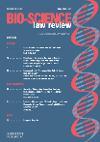Bio-Science Law Review - Volume 19 - Issue 1

ARTICLES
SEVEN PATENT LAW ISSUES THE UPC WILL NEED TO RESOLVE QUICKLY
PAUL ENGLAND
Taylor Wessing, London
When the Unified Patent Court opens it is likely to use existing bodies of national case law and EPO case law to guide it. But arguments based on national case law may not all be the same. This article explores the tensions and harmonies between national approaches via seven areas of substantive patent law on which the UPC Court of Appeal will need to find a common approach.
PATENTING OF INVENTIONS RELATING TO GENOMIC EDITING TECHNOLOGY: TWO DECISIONS OF THE INTELLECTUAL PROPERTY HIGH COURT OF JAPAN
KLAUS HINKELMANN
German & European Patent, Attorney, Munich, Germany
In Japan the IPHC handed down two important decisions on CRISPR-Cas9 genome-editing related applications, which are reported and discussed in this article. Both applications had been rejected by the Examining Division at first instance and then by the Appeal Board because of lack of novelty over an older patent application which had been published after the priority date of the subject patent applications and because of lack of inventive step over a pre-published scientific paper. The IPHC rescinded one decision of the Japanese Patent Office and upheld the other.
COMPENSATION IN PHARMACEUTICAL PATENT CASES: WHO CAN CLAIM?
CHARLOTTE WEEKES AND SARAH TAYLOR
Pinsent Masons, London
JULES FABRE AND MARINA JONON
Pinsent Masons, Paris
GUNNAR MEYER
Wikborg Rein, Norway
If a preliminary injunction (PI) is granted and subsequently lifted because the patent is either found invalid or not infringed following a trial, it is generally accepted that the injuncted party has the right to claim compensation for the delay to market entry. The entitlement and ability of third parties to claim damages is less clear. This article considers the rights of third parties, such as healthcare providers for whom delays and losses caused by PIs are costly, who may be affected by PIs in a variety of jurisdictions, and recent claims in the UK and the Netherlands.
CASE COMMENTS
NOVARTIS V PHARMATHEN INJUNCTION CONFIRMS NETHERLANDS AS IDEAL VENUE FOR CROSS-BORDER PATENT CASES
GERTJAN KUIPERS
De Brauw Blackstone Westbroek N.V., Amsterdam
Dutch courts can impose sweeping cross-border injunctions against parent companies that facilitate infringement by their subsidiaries in foreign jurisdictions. This case illustrates how Dutch patent courts are not afraid to give their own assessment of patent claims and alleged infringement in foreign jurisdictions, even when PI judges from that jurisdiction have already handed down a different decision.
EXCLUSIVE LICENSING AND 'SALAMI SLICING' THE PATENT MONOPOLY: NEURIM PHARMACEUTICALS (1991) LTD V GENERICS UK LTD
JOHN HULL
Queen Mary, University of London
The relationship between the statutory right given to an exclusive licensee and any restrictions on the right contained in the exclusive licence itself has come under scrutiny by the Court of Appeal. The Neurim decision offers important clarification of section 67 of the 1977 Patents Act, tending to favour the licensor’s, rather than the licensee’s, position. The purpose of section 67 is clarified as enabling an exclusive licensee to recover its own losses (or its share of the infringer’s profits) in the event of infringement.
NEWS
EUROPEAN REPORTS
UPC Preparations Advance, But Will the CMs Delay Them?
PAUL ENGLAND Taylor Wessing, London
